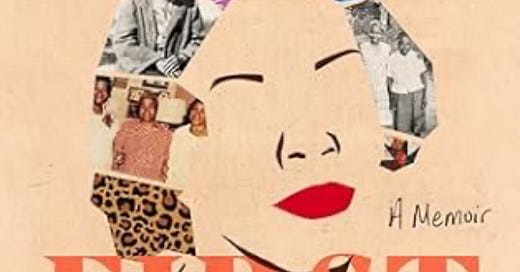Firstborn Girls Finding Themselves
Book Review of Bernice L. McFadden’s New Memoir
Maybe it’s the interdisciplinary researcher in me, but I truly enjoy a memoir that does more than just recount an individual life story. Memoirs that take on more, that pull at a more tangled thread (or many of them), feel revelatory in way that helps us better understand the human condition.
Out March 2025 from Dutton Books, Bernice McFadden’s new memoir FIRSTBORN GIRLS is not only a personal history, it’s a constellation of family and cultural history that explores cycles of trauma, the effects of segregation, and the dogged determination of women to survive. I was a bit surprised at the length of this book—clocking in at 400 pages—but McFadden doesn’t let us miss a detail, and the majority of the time, I was fully engrossed.
I’m not an avid reader of McFadden’s fiction. I’ve read her classics, but never followed her work closely. I was drawn to request and read this because of the title and my research obsession with daughters / daughtering. McFadden did not disappoint on that front, with the mother-daughter-auntie-grandmother lines of her family. She examines decisions of each of the women in her family: times they stay with abusive partners, times they stand up for themselves, times they try to get free. She measures herself against them, in both her good and bad decisions, mapping ways through the toughest moments in her life.
I’m a first born daughter like McFadden, with a whole cartload of younger siblings for which I was their secondary caretaker and provider, after my mother. I joke that I’ve done parenting already, so any desire to have kids burnt out really early. I deeply related to McFadden’s description of being a parentified child, (even in a two parent household, as her father was a drunk abusive parent for most of her life).
I thought I was just performing big sister duties. I didn’t know I was being trained to be a third parent -from chapter 11
Her sense of loyalty to her siblings and her mother make it difficult for her to imagine leaving or caring for herself first:
I would keep my desire a secret because just the thought of leaving wracked me with guilt. This is the penalty of being parentified. When a parentified child finally puts themselves first, it feels like a selfish act, in actually, it’s an act of self-care.
To become who she needs and wants to be, McFadden finds the courage to leave her household at a critical moment in her development, during high school. McFadden’s family has enough money at the time to send her to boarding school, which she requests, and this space gives her the ability to begin to self-define.
While her young adult life isn’t free from hardship, (such as tumultuous relationships and early parenthood), for me the biggest triumph of this memoir is McFadden’s realization of what choices she made for herself (from her self-knowing) that give her the mindset of success.
I wonder for myself, how would I be different if I had that kind of space as a young person, if I learned how to manage that guilt earlier on.
There’s much to this memoir, including history that shares the larger struggles of migration and economic status of Black Americans. There’s deep heart here, and while skimmed a few parts, it’s worth the read.
Find it here at my Bookshop (dot) org link!



